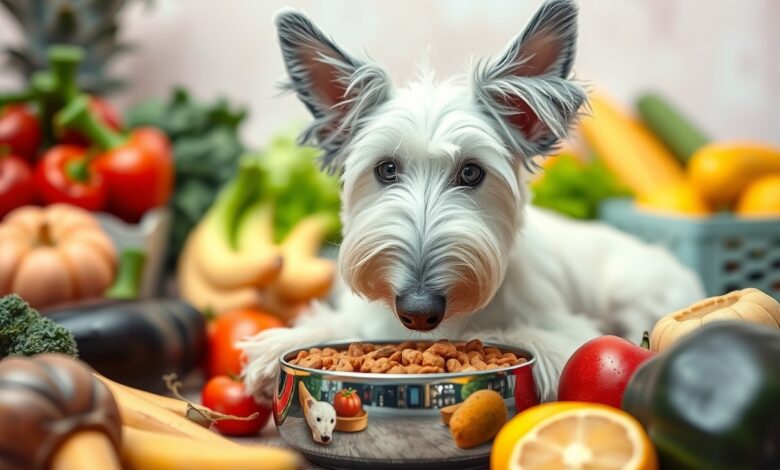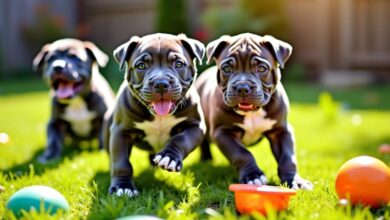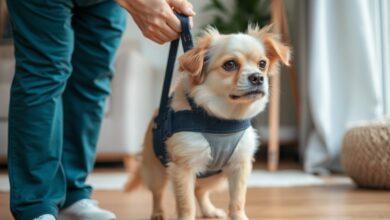Best Bedlington Terrier Diet – How to Keep Your Dog Healthy

Just as you strive for a balanced diet, your Bedlington Terrier needs the right nutrition to thrive. This unique breed is prone to certain health issues, making a well-planned diet important for their well-being. You’ll need to focus on high-quality protein and appropriate fat content while avoiding harmful fillers. Choosing foods rich in vitamins and minerals will help support their energetic lifestyle and promote a shiny coat. In this guide, we’ll explore the best dietary options and tips to ensure your furry friend remains healthy and vibrant.
Key Takeaways:
- Balanced Nutrition: Ensure your Bedlington Terrier’s diet includes a mix of high-quality proteins, healthy fats, and necessary carbohydrates to support optimal health.
- Regular Feeding Schedule: Establish a consistent feeding routine to prevent obesity and promote digestive health in your Bedlington Terrier.
- Hydration is Key: Always provide fresh water for your dog, as proper hydration is vital for their overall well-being and energy levels.

Understanding the Bedlington Terrier’s Nutritional Needs
To keep your Bedlington Terrier healthy, it’s necessary to understand their unique nutritional requirements. This breed has a high energy level and requires a balanced diet to maintain optimal weight and vitality. A combination of proteins, carbohydrates, and fats will provide the necessary nutrients your dog needs for active living and will help promote a shiny coat, strong muscles, and overall well-being.
How to Determine Ideal Dietary Components
For determining the best dietary components for your Bedlington Terrier, consider their age, weight, activity level, and any health concerns. You should select a high-quality dog food that lists real meat as the first ingredient and includes wholesome grains, fruits, and vegetables. Consulting your veterinarian can also help you tailor a diet that meets your dog’s specific needs.
Essential Vitamins and Minerals for Optimal Health
One important aspect of your dog’s nutrition is ensuring they receive necessary vitamins and minerals. These nutrients are vital for supporting various bodily functions, enhancing immune function, and preventing diseases.
Minerals play a significant role in your Bedlington Terrier’s health, specifically calcium for strong bones, phosphorus for energy production, and iron for circulation. Also, magnesium supports muscle function, while zinc is critical for a healthy immune system and maintaining a shiny coat. Ensuring your dog receives a balanced supply of these minerals can significantly enhance their overall well-being and longevity. Additionally, including necessary vitamins like vitamin A for vision and vitamin E as an antioxidant can bolster their health and vitality.
Choosing the Right Commercial Dog Food
You want to ensure your Bedlington Terrier thrives, and selecting the right commercial dog food is vital for their health. Look for dog foods specifically formulated for small breeds, as these will better meet their unique needs. Always opt for brands that have undergone rigorous quality tests and avoid those with excessive fillers or artificial ingredients.
How to Read Dog Food Labels
Choosing the right dog food requires an in-depth look at the label. Begin by examining the main ingredient, which should ideally be a high-quality protein. Check for the guaranteed analysis, which shows crude protein and fat percentages, to ensure a balanced diet. (Your accuracy in reading these labels will directly impact your dog’s health.)
Tips for Selecting High-Quality Ingredients
Choosing a diet rich in premium ingredients is important for your Bedlington Terrier’s welfare. Look for dog foods containing whole meats, fruits, and vegetables while avoiding those with by-products, fillers, or artificial preservatives. The ingredient list should prioritize high-quality components at the top for more nutrition. (Your investment in quality will lead to better health outcomes for your pet.)
- Whole meats should be the primary ingredient.
- Avoid by-products and fillers.
- Watch out for artificial additives.
Choosing dog food with high-quality ingredients can make a substantial difference in your pet’s well-being. Focus on foods that list real animal protein as the first ingredient, followed by wholesome grains or vegetables. Scout for foods rich in omega fatty acids for a shiny coat and optimal health. (Ensuring high standards in their diet sets your dog up for a long, healthy life.)
- Real animal protein first on the list.
- Rich in omega fatty acids for better coat health.
- Whole grains or vegetables for additional nutrients.
Food choices matter immensely; thus, familiarize yourself with nutritious options to keep your Bedlington Terrier content and healthy. Prioritize natural ingredients while steering clear of harmful substances.
Homemade Diet Considerations
Keep in mind that a homemade diet can offer tailored nutrition for your Bedlington Terrier, but it requires careful planning to ensure it meets all of their dietary needs.
Factors to Consider When Preparing Homemade Meals
To prepare effective homemade meals, consider the following factors:
- Balance of protein, carbohydrates, and fats
- Inclusion of vitamins and minerals
- Avoidance of toxic foods for dogs
- Adaptations for specific health issues
Thou must ensure that every meal is thoughtfully constructed for optimal health.
How-to Create Balanced Recipes for Your Bedlington Terrier
When crafting recipes, start with the right blend of ingredients that caters to your dog’s size and activity level. Your goal is to combine high-quality protein sources like chicken or fish with complex carbohydrates such as brown rice or sweet potatoes, alongside healthy fats from options like fish oil. Also, including fresh vegetables adds imperative fibers and nutrients. It is important to avoid ingredients that are harmful to dogs, such as onions and grapes. Ultimately, providing a well-balanced diet will support your dog’s energy levels and overall health, ensuring they thrive in their environment.
Portion Control and Feeding Schedule
Your dog’s health greatly relies on the right portion control and a consistent feeding schedule. It’s necessary to measure each meal to prevent obesity and ensure your Bedlington Terrier enjoys a balanced diet. Establish predetermined times for feeding to regulate digestion and energy levels, and always consider their age, weight, and activity level when deciding how much to serve.
Tips for Monitoring Portion Sizes
There’s a need to keep an eye on your dog’s portion sizes to avoid overfeeding. Utilize the following tips:
- Use a measuring cup to serve each meal.
- Consult the feeding guidelines on dog food packages.
- Adjust based on your dog’s activity level.
- Monitor your dog’s weight regularly.
Recognizing the signs of weight gain can help you adjust portions timely.
How-to Establish a Consistent Feeding Routine
Feeding your Bedlington Terrier at the same times each day creates a consistent feeding routine. This helps regulate your dog’s metabolism and makes it easier to monitor their appetite. Aim for two meals a day, ideally spaced 12 hours apart, and try to maintain these times even on weekends.
Routine is key when establishing a consistent feeding schedule. Feeding your Bedlington Terrier at the same times each day helps to regulate their metabolism and can prevent overeating. Set specific times for meals, typically twice daily, and remain consistent, ensuring they aren’t fed table scraps or excessive treats. This practice can result in a healthier dog and reinforce desirable eating behaviors. Adhering to a routine will also make it easier to detect any changes in their appetite or digestion, leading to a healthier lifestyle overall.
Common Dietary Issues to Watch For
Many Bedlington Terriers experience dietary issues that can affect their overall health. Common problems include food allergies, where your dog may show signs of itching or gastrointestinal upset, and obesity, which can lead to joint and heart issues. It’s important to be vigilant and monitor your dog’s reactions to their food, as well as to consult a veterinarian if you notice any changes in their behavior or health.
Factors That May Affect Your Dog’s Diet
For maintaining a healthy diet for your Bedlington Terrier, several factors can influence their nutritional needs:
- Age
- Activity Level
- Health Conditions
- Weight
- Breed-Specific Needs
This means that you should tailor your dog’s diet based on these variables to ensure optimal health.
How-to Recognize Signs of Dietary Problems
Your Bedlington Terrier may show various signs that indicate dietary problems. Look for vomiting, diarrhea, weight loss, and changes in appetite. You should also monitor their energy levels, as a lack of vitality can be a red flag. Frequent itching, licking, or skin infections can be more symptoms of food allergies. Keeping track of your dog’s eating habits and behavior will help identify any potential concerns.
A thorough observation is crucial to effectively recognize signs of dietary problems. While some signs, like occasional vomiting, might be minor concerns, others can indicate serious issues that need immediate attention. Look for persistent symptoms such as diarrhea lasting more than a day or drastic changes in appetite, as these can signal more profound health issues. If you see symptoms, a consultation with a veterinarian is often needed. Keeping a detailed record of your dog’s routine and any changes can help in diagnosing the problem. Staying proactive is vital for your pet’s well-being.

Special Dietary Needs for Active and Senior Dogs
After considering your Bedlington Terrier’s age and activity level, it’s necessary to tailor their diet to meet specific needs. Active dogs may require more protein and calories, while senior dogs benefit from easily digestible nutrients to support joint health and overall vitality. Nutrient-rich foods can help maintain energy levels and promote longevity, making dietary adjustments vital as your dog ages or becomes more active.
How-to Adjust Diet for Activity Level
Activity levels significantly influence your dog’s dietary requirements. Ensure that you provide a balanced intake of proteins, carbohydrates, and fats tailored to your Bedlington’s activity. If your dog is more active, consider increasing their calorie intake or adding high-calorie treats (Your vet can help decide on the right balance for your dog).
Tips for Senior Bedlington Terriers
On the other hand, keeping your senior Bedlington Terrier healthy requires attention to their dietary needs. You should focus on nutrient-dense meals that support their joint health, enhance digestion, and maintain a healthy weight. Here are some tips:
- Provide joint supplements for mobility
- Opt for high-fiber foods to aid digestion
- Monitor weight changes closely
Recognizing these indicators early can prevent serious health issues.
Plus, senior Bedlington Terriers often struggle with weight management and joint issues. Ensure you’re feeding them appropriately to help maintain a healthy figure. Incorporating low-calorie treats and consistent feeding schedules can assist in weight control, while regular vet check-ups can address any dietary deficiencies. Here’s what to keep in mind:
- Choose age-appropriate food
- Include moisture-rich options to prevent dehydration
- Limit processed foods high in sodium
Recognizing these factors will lead to a better quality of life for your senior companion.
To wrap up
Conclusively, providing your Bedlington Terrier with a well-balanced diet is imperative for their overall health and well-being. Ensure you choose high-quality dog food that caters to their specific dietary needs, particularly if they have allergies. For more insights, you can check this link for recommendations on diets suitable for Bedlington Terriers with allergies: Bedlington Terrier | Hi there, Can anyone recommend … Your commitment to their nutrition will help them live a thriving and active life.
FAQ
Q: What should I look for in a high-quality dog food for my Bedlington Terrier?
A: When choosing a high-quality dog food for your Bedlington Terrier, prioritize a formula that features real meat as the primary ingredient. Look for a balance of protein, fat, and carbohydrates, with important vitamins and minerals to support overall health. It’s ideal if the food contains omega fatty acids for skin and coat health, as well as antioxidants for immune support. Additionally, choose a recipe that is free from artificial additives, fillers, and excessive grain, as Bedlington Terriers may have sensitive stomachs. Always check for AAFCO certification to ensure the diet meets the necessary nutritional standards.
Q: How often should I feed my Bedlington Terrier and what portion sizes are appropriate?
A: Adult Bedlington Terriers typically benefit from being fed twice a day, with portion sizes depending on their weight, age, and activity level. As a general guideline, an adult Bedlington Terrier may require around 1 to 1.5 cups of high-quality dry dog food daily, split into two meals. Puppies, on the other hand, may need to eat three to four times a day to support their growth. It’s important to adjust portion sizes based on your dog’s individual needs and energy levels, and keep an eye on their weight to prevent obesity. Consulting with a veterinarian can provide tailored feeding recommendations for your dog.
Q: Are there specific dietary supplements that can benefit my Bedlington Terrier?
A: Yes, certain dietary supplements can be beneficial for Bedlington Terriers, particularly those that promote joint health, coat condition, and general well-being. Omega-3 fatty acids, often found in fish oil supplements, can enhance skin and coat health, while glucosamine and chondroitin can support joint mobility—important for keeping your dog active. Probiotics may also aid digestion and gut health, especially for dogs with sensitive stomachs. Always consult with your veterinarian before adding supplements to your dog’s diet, as they can provide guidance on appropriateness and dosage specific to your Bedlington Terrier’s health needs.





